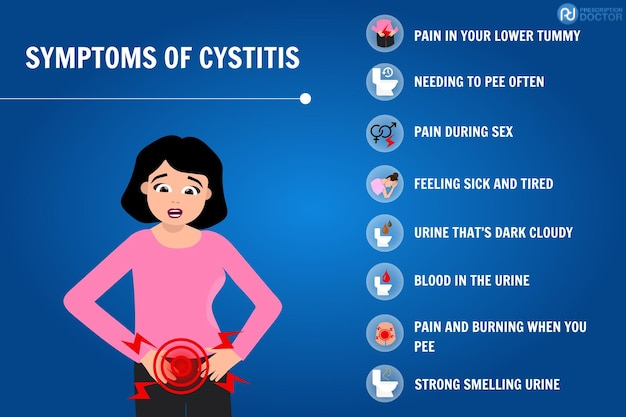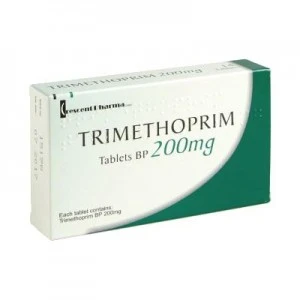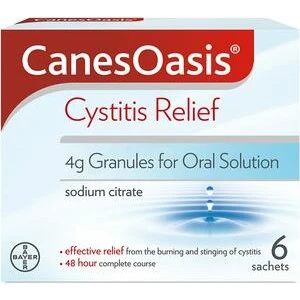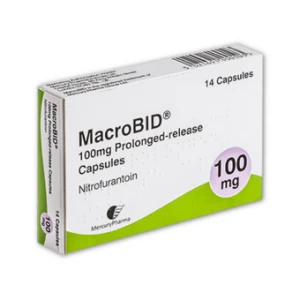How to Get Rid of Cystitis Fast: Quick Cystitis Relief
Cystitis is a common and uncomfortable infection that affects the urinary tract and bladder. Most women will get it at least once in their lifetime, and it's also possible in men.
The condition is usually caused by the bacterium E. coli entering the urethra, which leads to inflammation of the bladder. Symptoms of cystitis include a constant need to urinate, a stinging sensation while urinating, cloudy or smelly urine, and pain in the lower abdomen.
While it usually resolves on its own after a few days, there are several things you can do to get quick relief from cystitis and get things back to normal as soon as possible. So, if you’re wondering how to get rid of cystitis fast, join us as we outline everything you need to know.
Preventing Cystitis
As well as understanding how to treat cystitis, it’s also worth knowing what causes it and how to prevent it. Prevention is better than a cure after all. Let’s get started.
What Can Cause Cystitis?
The overwhelming majority of cystitis cases – around 75% to 95% – are caused by a bacterium called E. coli (Escherichia coli). It normally lives harmlessly in your intestines, but problems start when it migrates from your bowel to your urinary tract.
Because the female urethra is both shorter and positioned close to the anus, where E. coli is present, bacteria can easily travel from the rectal area up through the urethra and into the bladder. This is why women are far more likely than men to develop UTIs.

While E. coli is the main culprit, other bacteria can also cause cystitis. Klebsiella, Proteus mirabilis, and various Enterobacteriaceae can all cause bladder infections. In younger women, Staphylococcus saprophyticus is another common cause, accounting for 42% of infections in females aged 16-25.
Certain factors make cystitis more likely. Sexual intercourse, spermicide use, and having a new sexual partner all increase your risk. Other risk factors include diabetes, kidney stones, and having a weakened immune system.
Ways to Prevent Cystitis
Prevention focuses on reducing the risk of bacteria reaching your bladder. While no method is foolproof, several strategies can help.
Drinking at least 2 litres of water daily is one of the most effective measures. In one study, increased water intake decreased cystitis episodes by 1.5 per year. Staying hydrated helps flush bacteria out of your urinary tract before they can cause an infection.
Behavioural modifications can help, such as urinating before or after intercourse, wiping from front to back after using the toilet, and avoiding spermicides or diaphragms for contraception.
Cranberry products may help women with recurrent UTIs, though their effectiveness varies. Cranberries contain compounds called proanthocyanidins that may prevent bacteria from adhering to the bladder wall.
For postmenopausal women, topical vaginal oestrogen is sometimes recommended to reduce future UTI risk. This helps restore the protective bacterial environment and maintain healthy bladder tissues.
If recurrent infections persist despite these measures, a low-dose antibiotic is considered the gold standard for prevention, typically taken for at least 6 months.
Is There a Cure for Cystitis?
Yes, cystitis is highly curable with appropriate treatment. For most women with uncomplicated cystitis, antibiotic treatment for 1 to 3 days is enough to relieve symptoms. However, men typically need to take antibiotics for seven to 14 days, and pregnant women or those with conditions like diabetes may also require longer treatment.
It's crucial to complete your full course of antibiotics even if you feel better. If you don't finish your full course of medicine, your acute cystitis may come back and be more challenging to treat.
Trimethoprim UTI Tablets
- Effectively treats cystitis
- Short course of treatment
- No extra cost
For recurrent cystitis, the "cure" becomes more about management and prevention. In these cases, identifying and addressing underlying risk factors, combined with preventive strategies, is essential for staying infection-free in the long term.
How to Treat Cystitis at Home
If you do unfortunately contract cystitis, there are several ways to try and combat the infection without resorting to tablets or antibiotics. Here are a few simple recommendations for how to treat cystitis at home:
Flush Out the Infection
As cystitis is most commonly caused by bacteria inside the urethra, removing or “flushing out” the bacteria to rid yourself of the infection is the first step. This includes drinking plenty of water throughout the day and emptying the bladder fully. Avoid waiting to urinate, as this can allow the bacteria to multiply and prolong the infection.
Get Plenty of Rest
Giving your body enough time to rest is an easy way to get rid of cystitis. Taking it easy wherever possible, even for a short while, can help your immune system recover and fight off the infection.

Manage Pain Symptoms
Try taking over-the-counter medication such as ibuprofen and paracetamol to help with the pain and discomfort caused by bladder inflammation. If you are experiencing worsening symptoms that are concerning you, such as blood in your urine or a high fever, or your condition hasn't improved after a few days, it's essential to visit your GP, as you may require an antibiotic, such as Trimethoprim.
Practise Good Hygiene
Establishing good hygiene practices is another simple way to get rid of cystitis at home. Some examples include:
- Wiping from front to back after using the toilet to prevent the spread of germs and bacteria from the anus into your urethra.
- Washing our hands thoroughly and regularly with antibacterial soap.
- Wearing loose-fitting clothing, especially at night, allows your intimate areas to breathe and prevents moisture from being trapped.
- Avoiding perfumed products when showering, which can irritate your skin
Take Action to Find Relief
While you’re recovering, there are a few things you can do to get quick cystitis relief. Using a hot water bottle, especially at night, can help alleviate the pain. You can also take hot showers to feel more comfortable, or even take short walks. However, it’s essential not to engage in any overly strenuous activities while you’re healing.

Make Lifestyle Changes
There are a few lifestyle alterations that should assist with clearing the infection faster:
- Avoid drinking caffeine as it could irritate the bladder further.
- Avoid sexual intercourse, as sex can cause cystitis by spreading bacteria to the urethra.
- Maintain a healthy immune system by eating a balanced diet to help your body fight off infections.
How to Get Rid of Cystitis Fast
When you're dealing with painful cystitis symptoms, fast relief is what matters most. Prescription antibiotics offer the quickest route to recovery, with most people experiencing relief within 36 hours of starting treatment. Here are the main treatment options available:
Trimethoprim
A commonly prescribed antibiotic that targets the bacteria causing your infection. Trimethoprim is often recommended for uncomplicated cystitis when local resistance rates are below 20%. Taken twice daily for three days, it effectively eliminates the infection while minimising side effects. It works by stopping bacteria from producing the proteins they need to survive and multiply.
Trimethoprim UTI Tablets
- Effectively treats cystitis
- Short course of treatment
- No extra cost
CanesOasis
An over-the-counter symptom relief option containing sodium citrate. It works by making your urine less acidic, reducing the burning and stinging sensations when you urinate. When taken as three sachets daily for 2 days, CanesOasis can provide relief within 48 hours. While it helps manage discomfort, it doesn't cure the underlying bacterial infection. If symptoms persist, you'll need antibiotics. Please note that this product is not suitable for cystitis in men.
CanesOasis Cystitis Relief
- Eases discomfort
- Cranberry flavour
- Provides relief within 48 hours
Nitrofurantoin
Nitrofurantoin is considered the first-choice antibiotic for simple cystitis, with impressive clinical cure rates of 79% to 92%. It is particularly effective because it concentrates in the urine, effectively targeting bacteria.
Nitrofurantoin (Macrobid) UTI Antibiotics
- Kills bacteria
- Short course treatment
- Eligible for next-day delivery
The key to fast recovery is starting treatment as soon as symptoms appear. Combined with drinking plenty of water and taking pain relievers like paracetamol or ibuprofen, these treatments can have you feeling better within days.
Can Cystitis Go Away on Its Own?
Yes, cystitis can sometimes resolve on its own, but it's not guaranteed. Research shows that uncomplicated cystitis resolves naturally in about 25-50 out of 100 women within 1 week. Your immune system can often fight off the bacterial infection on its own, especially if it's caught early and you're otherwise healthy.
However, there are important considerations. While waiting for symptoms to improve naturally, you'll likely experience several days of uncomfortable burning, frequent urination, and pain. Antibiotics provide much faster relief – typically within 36 hours – and prevent potential complications.
The main risk of leaving cystitis untreated is that the infection could spread to your kidneys. This is a much more serious condition requiring urgent medical attention. Warning signs include fever, back or side pain, nausea, and feeling generally unwell.

Certain groups should always seek treatment rather than waiting it out. Men, pregnant women, and people with underlying health conditions like diabetes should see a doctor promptly, as they're at higher risk for complications. If you experience recurrent cystitis, blood in your urine, or worsening symptoms after a couple of days, antibiotics are necessary.
The bottom line? While mild cystitis can resolve on its own, antibiotics offer faster, more reliable relief and help prevent complications. If you're in significant discomfort or concerned about your symptoms, it's always best to seek medical treatment.
How to Get Rid of Cystitis: Frequently Asked Questions
Dealing with cystitis can be uncomfortable and disruptive. Below, we've answered the most common questions about treating and managing bladder infections to help you find relief quickly.
How to Treat Cystitis
The most effective treatment for cystitis is a course of antibiotics. First-line options include nitrofurantoin and trimethoprim. For most women, a three-day course is sufficient, though men typically need seven to fourteen days. Complete the entire course even if you feel better – stopping early can allow the infection to return.
Are There Any Home Remedies for Cystitis?
While antibiotics are the only proven cure, several remedies can help manage symptoms:
- Drink at least 2 litres of water daily to flush out bacteria.
- Take paracetamol or ibuprofen for pain relief.
- Sodium citrate products like CanesOasis make your urine less acidic, reducing burning sensations.
- Apply a hot water bottle to your lower abdomen for comfort.
- Avoid caffeine, alcohol, and acidic drinks as these irritate your bladder.
How to Relieve Bladder Inflammation
Stay well-hydrated with plain water and rest as much as possible. Use a hot water bottle or heating pad on your lower abdomen. Take ibuprofen, which reduces both inflammation and pain. Avoid bladder irritants, including spicy foods, caffeine, and alcohol. Empty your bladder fully each time you urinate. If inflammation persists beyond a few days, seek medical treatment.

Do You Need Antibiotics for Cystitis?
Not always, but they're highly recommended. Uncomplicated cystitis resolves naturally in about 25-50% of women within a week. However, antibiotics provide much faster relief – typically within 36 hours – and prevent kidney complications. Men, pregnant women, people with diabetes, and anyone with blood in their urine, fever, or back pain should always take antibiotics.
How to Relieve Cystitis Pain
Take paracetamol or ibuprofen as directed. Apply warmth to your lower abdomen using a hot water bottle. Drink plenty of water to dilute your urine. Sodium citrate products can relieve burning sensations within 48 hours. Avoid caffeine, alcohol, spicy foods, and acidic drinks. Rest and wear loose, comfortable clothing. If pain is severe or accompanied by fever, seek medical attention.
What's the Quickest Way to Get Rid of a UTI?
Prescription antibiotics are the quickest solution, with most people experiencing relief within 36 hours. Nitrofurantoin is particularly fast-acting. Start antibiotics as soon as symptoms appear, drink at least 2 litres of water daily, and take the full course exactly as prescribed. The sooner you begin treatment, the quicker you'll recover.
Cystitis Treatments You Can Trust
If you’re wondering how to get rid of cystitis fast, using licensed medications such as Trimethoprim and Nitrofurantoin is an effective option. The question is, where should you get them from?
Prescription Doctor is here to take the hassle out of healthcare. Our experienced clinicians will assess your circumstances to determine whether your chosen treatment is suitable. If not, an alternative solution may be suggested. All orders approved before 3pm on a weekday are eligible for next-day delivery, and everything dispatched from our General Pharmaceutical Council-registered pharmacy is sent in plain packaging for total discretion.
We’re here to support you at every step, which is why our clinicians are available to answer any queries you may have. You can also find a library of useful information on our website, such as how to prevent cystitis and an explanation of recurrent cystitis. Whatever you need, you can depend on us.
Take control of the situation today and begin your consultation with Prescription Doctor.
Sources
- International Journal of Clinical Practice (2021): Women's self-management skills for prevention and treatment of recurring urinary tract infection.
- NIH (2023): Staphylococcus saprophyticus Infection.
- NIH (2023): Cystitis.
- Healthline (2024): E. Coli and UTIs (Urinary Tract Infections): The Common Connection.
- NIH (2025): Recurrent Urinary Tract Infections.
- PubMed (2011): Guidelines for the diagnosis and management of recurrent urinary tract infection in women.
- Nature Reviews (2018): Nonantibiotic prevention and management of recurrent urinary tract infection.
- Informed Health (2023): Acute cystitis: Research summaries – How effective are antibiotics in treating acute cystitis?
- American Family Physician (2011): Diagnosis and Treatment of Acute Uncomplicated Cystitis.
- PubMed (2023): Cranberries for preventing urinary tract infections.
- NHS: Cystitis.
- NHS Inform (2025): Cystitis.
Authored By

Sam Jeans
Medical Content WriterPublished on: 20/09/2019 Re-Published on: 26/11/2025
Reviewed By

Mohamed Imran Lakhi
MPharm - Lead PharmacistReviewed on: 26/11/2025
© 2013 - 2026 Al Muhsineen Limited. All Rights Reserved. Registered Pharmacy: 34 Halliwell Road, Bolton BL1 8RL. Registered Office: 254 First Floor, Shearbrow, Blackburn, England, BB1 8DS









